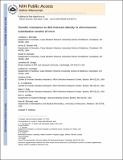| dc.contributor.author | Burrage, Lindsay C. | |
| dc.contributor.author | Baskin-Hill, Annie E. | |
| dc.contributor.author | Sinasac, David S. | |
| dc.contributor.author | Singer, Jonathan B. | |
| dc.contributor.author | Croniger, Colleen M. | |
| dc.contributor.author | Kirby, Andrew | |
| dc.contributor.author | Kulbokas, E. J. | |
| dc.contributor.author | Daly, Mark J. | |
| dc.contributor.author | Broman, Karl W. | |
| dc.contributor.author | Nadeau, Joseph H. | |
| dc.contributor.author | Lander, Eric Steven | |
| dc.date.accessioned | 2014-01-31T18:37:56Z | |
| dc.date.available | 2014-01-31T18:37:56Z | |
| dc.date.issued | 2010-02 | |
| dc.date.submitted | 2009-09 | |
| dc.identifier.issn | 0938-8990 | |
| dc.identifier.issn | 1432-1777 | |
| dc.identifier.uri | http://hdl.handle.net/1721.1/84628 | |
| dc.description.abstract | Discovery of genes that confer resistance to diseases such as diet-induced obesity could have tremendous therapeutic impact. We previously demonstrated that the C57BL/6J-Chr[superscript A/J]/NaJ panel of chromosome substitution strains (CSSs) is a unique model for studying resistance to diet-induced obesity. In the present study, three replicate CSS surveys showed remarkable consistency, with 13 A/J-derived chromosomes reproducibly conferring resistance to high-fat-diet-induced obesity. Twenty CSS intercrosses, one derived from each of the 19 autosomes and chromosome X, were used to determine the number and location of quantitative trait loci (QTLs) on individual chromosomes and localized six QTLs. However, analyses of mean body weight in intercross progeny versus C57BL/6J provided strong evidence that many QTLs discovered in the CSS surveys eluded detection in these CSS intercrosses. Studies of the temporal effects of these QTLs suggest that obesity resistance was dynamic, with QTLs acting at different ages or after different durations of diet exposure. Thus, these studies provide insight into the genetic architecture of complex traits such as resistance to diet-induced obesity in the C57BL/6J-Chr[superscript A/J]/NaJ CSSs. Because some of the QTLs detected in the CSS intercrosses were not detected using a traditional C57BL/6J × A/J intercross, our results demonstrate that surveys of CSSs and congenic strains derived from them are useful complementary tools for analyzing complex traits. | en_US |
| dc.description.sponsorship | National Center for Research Resources (U.S.) (RR12305) | en_US |
| dc.description.sponsorship | National Cancer Institute (U.S.) (U54CA116867) | en_US |
| dc.description.sponsorship | Charles B. Wang Foundation | en_US |
| dc.language.iso | en_US | |
| dc.publisher | Springer-Verlag | en_US |
| dc.relation.isversionof | http://dx.doi.org/10.1007/s00335-010-9247-9 | en_US |
| dc.rights | Creative Commons Attribution-Noncommercial-Share Alike 3.0 | en_US |
| dc.rights.uri | http://creativecommons.org/licenses/by-nc-sa/3.0/ | en_US |
| dc.source | PMC | en_US |
| dc.title | Genetic resistance to diet-induced obesity in chromosome substitution strains of mice | en_US |
| dc.type | Article | en_US |
| dc.identifier.citation | Burrage, Lindsay C., Annie E. Baskin-Hill, David S. Sinasac, Jonathan B. Singer, Colleen M. Croniger, Andrew Kirby, E. J. Kulbokas, et al. “Genetic resistance to diet-induced obesity in chromosome substitution strains of mice.” Mammalian Genome 21, no. 3 4 (April 3, 2010): 115-129. | en_US |
| dc.contributor.department | Massachusetts Institute of Technology. Department of Biology | en_US |
| dc.contributor.mitauthor | Lander, Eric S. | en_US |
| dc.relation.journal | Mammalian Genome | en_US |
| dc.eprint.version | Author's final manuscript | en_US |
| dc.type.uri | http://purl.org/eprint/type/JournalArticle | en_US |
| eprint.status | http://purl.org/eprint/status/PeerReviewed | en_US |
| dspace.orderedauthors | Burrage, Lindsay C.; Baskin-Hill, Annie E.; Sinasac, David S.; Singer, Jonathan B.; Croniger, Colleen M.; Kirby, Andrew; Kulbokas, E. J.; Daly, Mark J.; Lander, Eric S.; Broman, Karl W.; Nadeau, Joseph H. | en_US |
| mit.license | OPEN_ACCESS_POLICY | en_US |
| mit.metadata.status | Complete | |
